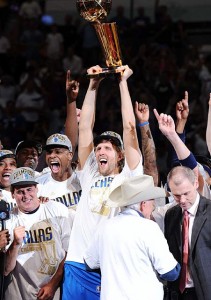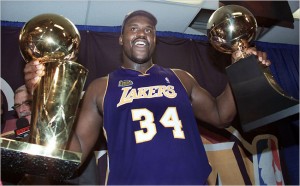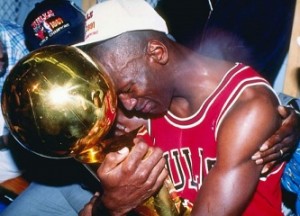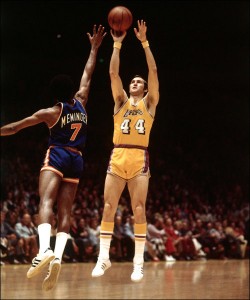10 Most Memorable Championship Breakthroughs in NBA History
After 13 years in the NBA, Mavericks forward Dirk Nowitzki is finally a NBA champion.
But he is not the only great player to win a NBA title after years of heartbreak.
Here are the 10 greatest championship breakthroughs in NBA history.
This list is not solely based on the greatness of the player, but how many disappointments that player or players had to go through before getting that elusive championship.
With that said, here is the list:
10. Ray Allen, Kevin Garnett, and Paul Pierce, 2008 Boston Celtics
In the summer of 2007, the Boston Celtics traded for Ray Allen and Kevin Garnett to join mainstay Paul Pierce to lead the Boston Celtics back from the doldrums of the NBA.
“The Big Three” lead the Celtics on the greatest single-season turnaround in NBA history, as the Celtics won 66 games during the regular season after winning 24 games the previous season, and then advanced to the NBA Finals, where they defeated the Los Angeles Lakers in six games for the franchise’s first NBA championship in 22 years and the first NBA title for Allen, Garnett, and Pierce.
9. Hakeem Olajuwon, 1994 Houston Rockets
“Hakeem the Dream” took his place among the great centers to play the game as he led the Houston Rockets to the NBA championship in 1994.
In a match-up of All-Star centers who had never won a NBA title, Olajuwon dominated Knicks center Patrick Ewing to win his first NBA title in his tenth NBA season.
“Hakeem the Dream” averaged 26.9 points, 9.1 rebounds, and 3.9 blocks per game in the seven games and made the game-saving play at the end of Game 6 in which he blocked John Starks’ potential game-winning three-pointer in the final seconds, to preserve a Houston victory and force a Game 7, where he scored 25 points and grabbed 10 rebounds to clinch the title for the Rockets.
One year later, Olajuwon and the Rockets won the title again, this time giving Clyde Drexler his first NBA title after 12 NBA seasons.
8. Shaquille O’ Neal, 2000 Los Angeles Lakers
By 2000, Shaq had become one of the most recognizable players in the NBA, but had yet to win a NBA championship.
In his first season under head coach Phil Jackson, O’ Neal led the Lakers to the 2000 NBA Finals and their first NBA championship since 1988 with a dominating performance over the Indiana Pacers.
In the six games, O’ Neal averaged 38 points and 16 rebounds per game to be named Finals MVP, the first of three MVPs and NBA titles for Shaq and the Lakers.
7. David Robinson, 1999 San Antonio Spurs
Robinson carried the Spurs throughout the 1990s, as he lead them to seven straight playoff appearances from 1990-1996 and was an All-Star in all seven seasons.
However, “The Admiral” was unable to lead the Spurs to the Finals, advancing only to the Western Conference Finals once, in 1995.
But Robinson got help when the Spurs selected Tim Duncan as the #1 pick in the 1997 NBA Draft and two years later, the Spurs won the NBA title, defeating the New York Knicks in five games.
Robinson would win one more championship before he retired after the 2003 season.
6. Julius Erving, 1983 Philadelphia 76ers
While he had won two championships in his five seasons with the ABA, Dr. J needed a NBA championship to cement his legacy as one of the best players of all time.
The Sixers made it to the Finals in three of Erving’s first six seasons with the team, but lost all three series, leading to the team to trade for center Moses Malone after Philadelphia’s 1982 Finals loss to the Los Angeles Lakers.
The Sixers made it back to the Finals in 1983 and they faced off with the Lakers in a rematch of the previous year’s Finals.
While Moses was the MVP of the series, it was Erving who sealed the championship for the Sixers as he scored seven straight points in the final minutes of Game 4, completing the four-game sweep of the Lakers and giving “The Doctor” his only NBA title.
5. Michael Jordan, 1991 Chicago Bulls
By his seventh season, Jordan had become arguably the best player in the league, but he and the Bulls had been unable to make it to the NBA Finals, thanks to three straight postseason losses to the Detroit Pistons, including two in the Eastern Conference Finals.
Finally in 1991, Jordan and the Bulls swept past the Pistons in the Eastern Conference Finals to advance to their first NBA Finals, where they faced the Los Angeles Lakers, led by Magic Johnson.
Jordan made the most of his initial appearance in the Finals as he averaged 31.2 points and 11.4 assists per game as the Bulls defeated the Lakers in five games for the first of six championships and Finals MVPs for Jordan.
4. Dirk Nowitzki, 2011 Dallas Mavericks
Avenging his loss to the Miami Heat in the 2006 Finals, Nowitzki led the Mavericks to a six-game upset win over the Heat and shredded his reputation as a “soft” player.
Nowitzki averaged 27 points and 9.4 rebounds per game, despite playing with a torn tendon in his left middle finger and a sinus infection in Game 4.
But what made his performance ever greater was how Nowitzki played in the fourth quarter as he scored a combined 62 points in the fourth quarter during the series to lead Dallas to comeback victories in Games 2, 3, and 5, to be named the Finals MVP.
3. Wilt Chamberlain, 1967 Philadelphia 76ers
Ever since he entered the league in the 1959-60 season, “Wilt the Stilt” was the most dominant offensive force that basketball had ever seen as he averaged over 30 points and over 20 rebounds per game in the first seven seasons in the league.
But his inability to defeat Bill Russell and the Boston Celtics in the playoffs led the press to believe that Chamberlain was incapable to win a championship.
However, Chamberlain led the Sixers to a then-record 68 wins during the 1966-67 season and then helped them to a five-game series win over the Celtics in the Eastern Conference Finals, ending their eight-year run as NBA champions.
In the Finals, Chamberlain only averaged 17.7 points per game, but averaged 28.7 rebounds per game, grabbling at least 23 rebounds in the six games as Philadelphia defeated the San Francisco Warriors to win the NBA championship.
2. Oscar Robertson, 1971 Milwaukee Bucks
After 10 seasons with the Cincinnati Royals, the “Big O” was traded to the Milwaukee Bucks to team up with center Lew Alcindor (now Kareem Abdul-Jabbar).
The trade paid off as the Bucks easily went through the playoffs compiling a 12-2 record during the playoffs, including a four-game sweep of the Baltimore Bullets in the NBA Finals.
While Alcindor was named the MVP of the series, Robertson was no slouch as he averaged 23 points, five rebounds, and nine assists per game during the series, and was the leading scorer in the Game 4 clincher, as he scored 30 points in the Bucks’ 118-106 win for the “Big O”’s first championship on the college or pro level.
1. Jerry West, 1972 Los Angeles Lakers
Despite gaining a reputation as one of the most clutch players in NBA history, West had not won a NBA championship in his 11 seasons with the Los Angeles Lakers.
West and the Lakers appeared in seven NBA Finals, losing all seven series, six of them to Bill Russell and the Boston Celtics.
But in his 12th season, West finally got his ring as the Los Angeles Lakers reeled off 33 straight wins during the 1971-72 season to finish the season with a then-record 69 wins, and then made it back to the NBA Finals, where the Lakers defeated the New York Knicks in five games for the championship.
While it was the only NBA championship of his playing career, West would get seven more rings as general manager of the Lakers from 1983-2002.




Hi: Website Owner. I like your WordPress site and I found your page with Google so I figure you could make some bank off of this. There is a WordPress addon for SEO that does automated SEO for your website, automatic SEO plugins like this are brand new to the online blog scene so having this would give your site a huge jump in views. If you are serious about making your blog get more popular and make money then click my name to check it out.
Fresh and interesting news from basketball world! Basknet.info – http://www.basknet.info/
hfmaydj
You have made some good points there. I looked on the web
to learn more about the issue and found most individuals will go along with your views on this website.
my page 色落ちしにくいデニムEGLシリーズ
each time i used to read smaller articles or reviews that as well clear their motive, and that is
also happening with this paragraph which I am reading now.
Michael Jordan, 1991 Chicago Bulls, the best of them !
If you’re a pupil or a young driver, you may be actually qualified for discounts on Auto Insurance policy.
Make sure to ask your Auto Insurance company about potential savings for younger drivers.